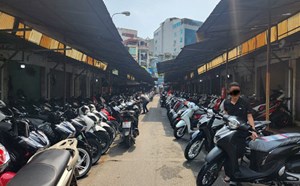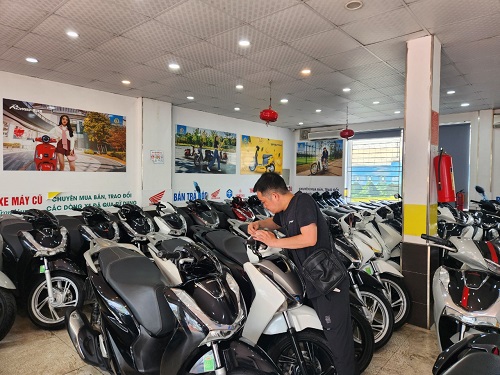The policy of limiting gasoline-powered motorbikes to reduce traffic congestion, environmental pollution and develop green transportation is a major and correct orientation. However, many opinions say that announcing a clear and transparent roadmap, along with support measures such as loan loans to change vehicles, inventory purchases, instructions on transfer procedures, quick fee payment... will help the market adjust naturally, avoiding the situation of "frozen" due to waiting mentality.
Recordings at Dich Vong old motorbike market (one of the busiest places for buying and selling old motorbikes in Hanoi) show that this place is going through a difficult period. Previously, a kiosk could sell 1015 cars a day, now it only sells 23 cars, even some days the transaction is empty-plate. The rows of kiosks are already bustling with buying and selling during the quiet hours, sellers sit and answer the phone, drink tea, chat to kill time.

Mr. Nguyen Thanh Tung (owner of a kiosk at the old Dich Vong motorbike market) said that since the beginning of the year, the number of visitors has decreased, but after receiving information about limiting gasoline vehicles in Ring Road 1, the situation has become even gloomy. Previously, I sold about 2030 cars a month, now I have a dozen cars. Currently, each vehicle has lost 10%15% compared to April 2025, while the cost of premises, electricity and water is still paid evenly, causing great pressure, said Mr. Tung.
According to Mr. Tung, he and some other kiosk owners are switching to electric vehicle business and boosting the market in the provinces. Previously, he sold about 2030 cars to the provinces each month (accounting for about 40% of the sales), but now he will prioritize this channel more.
However, the psychology of "inactive workers" causes goods to stagnate, transactions stagnate, and revenue decrease sharply, while rental costs and interest are still pressured. Many customers also consider more carefully, worried that the gasoline car they bought today will be difficult to use in the next few years if traveling in a restricted area.
Mr. Tu, owner of a chain of motorbike stores using Tu Tai in Cau Giay area, believes that limiting gasoline-powered vehicles to reduce environmental pollution in the inner city is a correct policy. However, this also clearly affects the used car market. "Currently, motorbike prices have decreased by about 10%15% compared to before, equivalent to each vehicle losing 710 million VND. On average, we can lose about 2-3 billion VND per month, said Mr. Tu.
Despite the gloomy context, the used motorbike market in Hanoi is not completely at a standstill. The trend of switching to electric motorbikes is happening rapidly, with prices increasingly competitive.
Many kiosk owners said that new electric vehicles are now only over ten million VND, some less famous brands are cheaper, do not consume gas, and do not need to register complicated license plates. Many customers have switched from buying old gasoline motorbikes to new electric vehicles to save operating costs.

Along with that, programs to "exchange old cars for electric cars" with financial support are being implemented by many businesses, attracting customers. Online shopping channels have also developed strongly, helping customers easily compare prices, vehicle life, and maintenance history without having to go to the market. This poses challenges for the traditional car market model but also opens up opportunities for traders to expand to the used electric vehicle segment or apply online business.
Mr. Tung believes that when the government's support is demonstrated through specific and clear policies, the major policies on the environment and quality of life will be realized in a humane way, ensuring that no one is left behind in the transition process. At that time, used car traders will also adapt and change their business methods for sustainable development.












